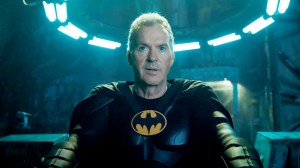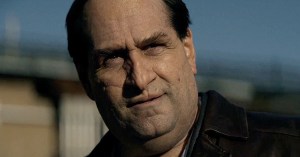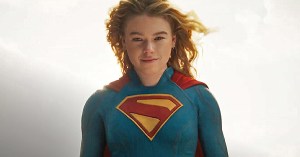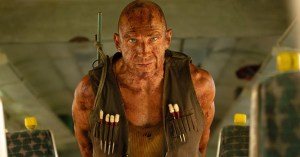Dickinson and Hawkeye Star Hailee Steinfeld Relishes Playing Strong-Willed Characters Who ‘Use Their Voice’
The star of the Apple TV+ historical drama and Disney+'s upcoming Marvel superhero series celebrates her characters' moxie and joins her Dickinson costars and series creator Alena Smith for a preview of the new season.
When creator Alena Smith’s biographical drama Dickinson premiered on Apple TV+ in 2019, it almost instantly became television short-hand for the Millennial malaise. After all, what says “stuck in a rut and not feeling like you’re being taken seriously by your family or at work” than an anachronistic-heavy story about Emily Dickinson — a poet whose sole authenticated adult portrait looks like she’s giving what passed for an eye roll in mid-19th century Massachusetts?
Depicted here by actress Hailee Steinfeld, she’s a pouting, twerking insomniac who has self-sequestered in her childhood bedroom. She harbors (sometimes unrequited) feelings for her brother’s fiancée and dreams of taking carriage rides with Death (Wiz Khalifa) while her parents breath down her neck about finding a nice young man. The first season was Certified Fresh with favorable reviews mentioning how it “challenges our straight-washing of history” and holds a “sense of fun, if not humor, that pervades even scenes about mortality or misogyny.”

(Photo by Apple TV+)
The second season, which premieres its first three episodes January 8 on Apple TV+, ups the show’s spooky and supernatural vibe. During the course of the season, Emily and her sister, Lavinia (Anna Baryshnikov), lead a séance with the help of their brother’s employee, Hattie (Ayo Edebiri, who is also one of the show’s writers). And Nick Kroll guest stars as Edgar Allan Poe (even though, for those doing the math at home, the mortality-obsessed poet died a decade before this season’s setting of 1859).
But the eeriness particularly resonates with a character known simply as Nobody. Played by The Americans alum Will Pullen, the mysterious figure manifests in a way that helps Emily handle her own inner turmoil over whether she should risk pursuing a career as a published poet – even if it means she could perish from rejection.
It’s a topic the real Dickinson pondered exhaustively.
“She very explicitly wrote in letters and poems, these really conflicted feelings about fame,” Smith told Rotten Tomatoes, adding that the poet “seemed to think that fame was very dangerous for artists.”
But because most of Dickinson’s work was discovered posthumously, Smith said, “the question is whether she kept saying that because she was trying to convince herself that she didn’t want something that she actually wanted very desperately. Or whether she was deeply was aware of how poetry comes from a really private place and that if you don’t protect that private, hidden inner life, you are going to lose touch with the truth.”

(Photo by Apple TV+)
Speaking of losing touch with the truth, Smith stressed in a letter to journalists about the series that “this is our fictional look” at Dickinson and her family and friends. Still, fame like Dickinson’s “just is so relevant and ubiquitous right now because of social media and the way that our lives are all happening online,” Smith said, making an exploration of the poet’s possible inner musings on the topic very timely.
“Everyone, on a daily basis is having to struggle with this question of ‘Do I put myself but there or not?,’” Smith said of today’s society. “And also, I suppose on the flip side, [of] being a consumer of social media and of these images that you see from people not knowing what’s real and what’s not.”
And it’s keenly an issue for the Dickinson cast who, because of the nature of their jobs, are public figures if not outright famous.
Steinfeld recalled that Smith met with her and her cast mates, asking each of them what was their relationship to fame and whether they want to be famous. Despite being a former child star who received an Academy Award nomination for 2010’s True Grit before she could legally drive, Steinfeld told Rotten Tomatoes, “I would say it’s not something I learned very quickly that I’ve thought of, really at all. I love the work that I do. And I love that I’m able to do it. And that’s really the extent of my thought process.”
“A big challenge, for me, was sort of taking myself out of my own life and out of my own thought process in regard to that, and kind of figuring out what [fame] was for Emily,” she said. “One thing this show has never failed to do is really challenge my way of thinking. Her poetry does that alone.”

(Photo by Apple TV+)
This season also introduces Game of Thrones actor Finn Jones depicting Samuel Bowles, the newspaper publisher and editor who was a close friend of Dickinson’s and her family. In the series, he may seem like he is flaunting his power and influence as he decides whether to publish one of her poems.
“It’s easy to feel like we need certain people, men and women, in our lives to help either better our careers or further our careers or personal things in our personal lives,” Steinfeld said. “And I think [this is about] coming to a realization that you can, in fact, achieve what it is you want in life on your own — it might take you longer, it might be harder, but you can. And we see that with these characters in a time where achieving anything outside of their norm was near impossible.”

(Photo by Jose Perez/Bauer-Griffin/GC Images)
And how does this compare to Steinfeld’s other TV role this year? In Disney+’s upcoming series Hawkeye, which is based on characters in the Marvel Cinematic Universe, she plays Kate Bishop, a character whom Jeremy Renner’s Clint Barton/Hawkeye grooms to take over his title.
“I do find that the characters I’ve played have … this strong will to stand up for themselves, have an opinion and a point of view, and use their voice,” she said. “And I love that. I love that I’ve been called on to play those roles as well.”
She also stresses that she didn’t necessarily intend to punctuate 2021 with one show about brains and another one about brawn, saying that “the timing of how things evolve and falling into place with everything that’s happened this year is sort of coincidental.”

(Photo by Apple TV+)
But stories of exposure and fame aren’t the only ways that this season of Dickinson — or the people depicted — resonate with today’s audiences. Edebiri’s Hattie is a fictional character, but Smith said, “we looked at some Black women writers from the time and, you know, they lived crazy lives, and they had senses of humor.”
And, despite spending much of the series being belittled by his father and underestimated by others, Dickinson brother Austin (Adrian Enscoe) secretly helps fund the publication of a Black-run newspaper and allows it to operate out of his barn.
“Abolitionism was really trendy in the northeast at this time,” Enscoe said; however, “there were deeply problematic things with the abolitionism movement just in the way that they that they viewed Black people as, like … some [people] that we have to save — like white saviorism. It’s interesting to apply that that view now to what Austin is doing.”

(Photo by Apple TV+)
The new season also continues to look at sexual relationships through the female gaze, especially when it comes to Ella Hunt’s Sue Gilbert — a woman whom historians know was both Austin’s wife and Emily’s partner.
“I’ve always felt like sexuality, and sex, plays a huge role and who Sue is,” Hunt said of the woman who started the series as an orphan from a lower economic standing than the Dickinson children. “I find it’s, at times, her escape out of her brain and into her body.”
This season, “Sue is in a position of power, sexually in a in a way that is exciting to see 19th century women being,” Hunt said.
Both Hunt and Baryshnikov expressed gratitude that two of the season’s four directors be women (Stacie Passon and Rosemary Rodriguez each directed two episodes) and that intimacy coordinator Nicole Callender was on set.

(Photo by Apple TV+)
Season 2 also challenges viewers’ expectations about another woman central to Dickinson’s life: her younger sister, Lavinia. Neither of the women married, and as complicated as Emily’s love life is portrayed here, her sister’s might appear simple, as a “spinster” to be pitied, stuck caring for everyone else, and who knitted and collected cats. In Baryshnikov’s portrayal, Lavinia does have those hobbies. But she also has sex with a suitor – lack of birth control options be damned – and can put on quite a lively dance number.
“I think with Emily, there’s a kind of obvious answer in our minds as to why she didn’t marry and have children like is expected of women at that time period; because she had this kind of craft that she was so devoted to, and she was kind of famously a little reclusive and different,” Baryshnikov explained. “And I had a really good time this year of figuring out the ways that Lavinia surprises herself in how much weirder and more eccentric and a little wilder than she ever would have thought.”
She added that “because the show blends reality … [creator Smith] and I have had a lot of freedom to collaborate together on what’s the most interesting version of this character woven in with historical facts.”
But how many anachronisms and fudging of evidence is too many?
“I don’t ever want to bump people out of like, the emotional experience that the characters are having,” Smith said. “Particularly within the context of the Dickinson family, or the real characters that we’re following, I want all those moments to feel very real.”
However, Smith added, “history was probably a lot more alive and vivid and contemporary than we really think of it as being.”
The first three episodes of Dickinson season 2 premiere January 8 on Apple TV+. Subsequent episodes will be released weekly on the digital platform.







